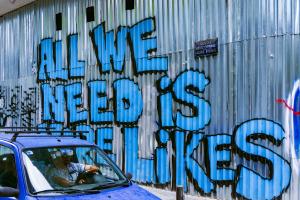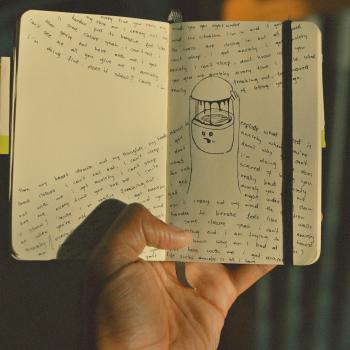 Even after a global pandemic brought our world to a screeching halt, most of us still managed to stay “busy,” which I have since discovered is nothing but a euphemism for being distracted.
Even after a global pandemic brought our world to a screeching halt, most of us still managed to stay “busy,” which I have since discovered is nothing but a euphemism for being distracted.
In his hugely popular self-help book, Deep Work, best selling author and professor Cal Newport argues that the culture of constant interruptions has destroyed our ability to focus on cognitively demanding tasks. Every moment of potential tranquility in our lives is spoiled by glancing at our smartphones, causing us to become “mental wrecks.” So damaged are we, that even when we do schedule time to concentrate we find that we are unable to do so.
Newport recommends a life philosophy that centers on solitude, focus, and a work ethic that allows you to master complicated information in a shorter amount of time. And he supports his claims using research in psychology, theology, neuroscience, and philosophy.
 Something as fundamental as reading a literary classic has become so daunting these days. Getting through a complicated read requires a prolonged attention span and an ability to process cognitively difficult themes and plot lines. It requires a mind capable of sustained engagement. Countless daily distractions can mutilate the mind and disrupt our ability to focus.
Something as fundamental as reading a literary classic has become so daunting these days. Getting through a complicated read requires a prolonged attention span and an ability to process cognitively difficult themes and plot lines. It requires a mind capable of sustained engagement. Countless daily distractions can mutilate the mind and disrupt our ability to focus.
But our ability to read complex literature is not the only thing that has suffered from distraction overload, religion has also taken a hit. We seemed to have forgotten that religion is not about shared psychosis and cultish symbolism. Religion is a way of life- a deep life.
If you are the religious type then the concept of deep work should not be foreign to you. Every religious tradition subscribes to the notion that the more you shrink your world the bigger it gets. In other words, the more you block exterior distractions the more your inner world blossoms and grows.
During one of his many interviews, world-renown religious scholar Huston Smith said he wished he had spent his life digging one deep well rather than many shallow holes. In other words, he wished he had spent more time focusing on studying one faith more deeply, rather than becoming a scholar and master of all faith traditions. When you focus on digging one deep hole rather than many shallow ones, you are more likely to hit upon a water source. And that water then becomes an endless spring of nourishment and inspiration.
Newport explores this psychological phenomenon but only as it applies to productivity in our professional, not religious aspirations.
Deep wells, deep thoughts, deep work eventually leads to a spring that allows us to generate more with less effort.
The Monk, the fragile egoist, and the Genius
 There are three situations that I believe warrant a complete shutdown of social media and other shallow distractions.
There are three situations that I believe warrant a complete shutdown of social media and other shallow distractions.
The first is if you are aspiring to be more spiritual. Those who wish to cultivate and reinforce a metaphysical view of reality have to create the ambiance and conditions that encourage those perceptions. When a monk retreats to the mountains, he is remodeling the conditions of his outer world to protect against the distractions that threaten to resurrect his ego. Sadly, we no longer understand this internal process. Even in our holiest sites, pilgrims routinely use smartphones to showcase their experiences on social media. By snapping and posting photos to capture the moment we lose out on the opportunity to cultivate the ambiance required for genuine transformation. Those who want to experience the transcendent should put away their devices.
 Not all individuals who disconnect are trying to access the numinous. Some individuals avoid social media because they need to preserve their grandiose sense of self. They might ascribe noble motivations for their social inaccessibility, like living more mindfully or pursuing a creative path. Or they may claim that they are above all that Facebook stuff. But at the heart of all this evasion is the terrifying fear of discovering that they are average like everyone else, or worse, that they are flawed or inadequate in some way.
Not all individuals who disconnect are trying to access the numinous. Some individuals avoid social media because they need to preserve their grandiose sense of self. They might ascribe noble motivations for their social inaccessibility, like living more mindfully or pursuing a creative path. Or they may claim that they are above all that Facebook stuff. But at the heart of all this evasion is the terrifying fear of discovering that they are average like everyone else, or worse, that they are flawed or inadequate in some way.
Malcolm Gladwell talked about this in his Book titled David and Goliath, where he explores this phenomenon as it applies to high school graduates at the top of their class. He noted that once small town highschool heroes make it into the Ivy League world of status and influence, many of them experience a crisis of self-esteem and literally breakdown. Having spent their lives being a big fish in a little pond, being a little fish in a big pond threatens their rapidly shrinking self-image.
 Gladwell recommends that emotionally fragile individuals are better off avoiding competitive Ivy League universities so they can preserve their sense of self-worth and find success in a less intimidating environment. I, on the other hand, think a little ego mortification is good for the soul. But there are certain individuals, especially teenagers, for whom an artificially constructed reality, where they are prominently featured for their skills, might be an important and necessary step towards helping them retain their mental well -being. Ego mortification is a process and not an event.
Gladwell recommends that emotionally fragile individuals are better off avoiding competitive Ivy League universities so they can preserve their sense of self-worth and find success in a less intimidating environment. I, on the other hand, think a little ego mortification is good for the soul. But there are certain individuals, especially teenagers, for whom an artificially constructed reality, where they are prominently featured for their skills, might be an important and necessary step towards helping them retain their mental well -being. Ego mortification is a process and not an event.
If we extend this analogy to include what happens to us on social media, we will realize that in the world of social media we are all little fish in a big swamp. And those with a fragile disposition may disintegrate in the same way that those college-bound teens did when faced with the realization that they are just average and human and insecure- just like everyone else.
The last scenario that I believe justifies a complete departure from social distractions applies to those who have the psychological profile of a Malcolm Gladwell or a Cal Newport. Those who feel driven and compelled to produce answers to life’s complex problems should keep their distance from life’s distractions. Society needs intellectually honest deep thinkers to dig the deep wells that will keep the rest of us hydrated. The world might have to depend on such individuals to do some serious deep work to get us out of our current and impending crisis.
When It’s not that Deep
 Not all deep work needs to be deep. We all need to learn to focus but we don’t all need to produce. Don’t confuse Deep work with over productivity and professional aspirations. Deep work can happen when we immerse ourselves in the mundane. If Cal Newport’s efforts at Deep Work leads to a series of manuscripts, mine might lead to a loaf of bread. There is deep work in domesticity and quality leisure activities. There is deep work in parenting, praying, and pampering yourself and others.
Not all deep work needs to be deep. We all need to learn to focus but we don’t all need to produce. Don’t confuse Deep work with over productivity and professional aspirations. Deep work can happen when we immerse ourselves in the mundane. If Cal Newport’s efforts at Deep Work leads to a series of manuscripts, mine might lead to a loaf of bread. There is deep work in domesticity and quality leisure activities. There is deep work in parenting, praying, and pampering yourself and others.
When it comes to understanding the ill effects of distraction overload it’s really not that deep. Technology is like food for our ‘eating disordered’ world. We can’t just give up on food. We have to figure out a way to consume it responsibly and recognize that the quality of our consumption is as important as the quantity.
And while social scientists self -isolate and battle out the pros and cons and do’s and don’t of media consumption, you can start your journey into a deeper more fulfilling less distracted mental and emotional space by committing to a cognitively challenging task like reading a classic. Or if that is too much to handle, then I highly recommend Newport’s book Deep work; because it’s not that deep, after all.











